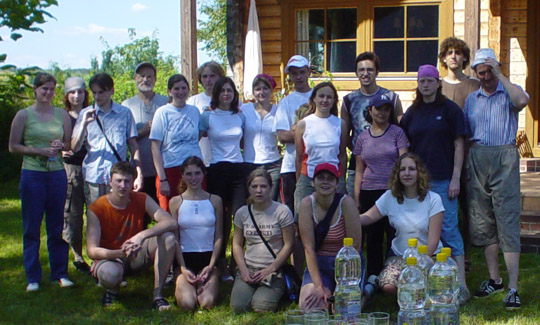
 [20041030] [besz?mol?]
[20041030] [besz?mol?] 
 IFOR Youth Summer Camp - EU Expansion: What is our common identity as Europeans? (B?ke, Mozgalom, Transzcendens)
IFOR Youth Summer Camp - EU Expansion: What is our common identity as Europeans? (B?ke, Mozgalom, Transzcendens) Magyar résztvevő is volt a BOCS Alapítványtól.
FOR Germany
IFOR Youth Summer Camp
EU Expansion: What is our common identity as Europeans?
As they have for the past 20 years, the German FOR again hosted the annual IFOR summer camp 24 July - 8 August, 2004. Though the camp was originally set up to bring together IFOR youth, FOR Germany, has had problems in the past few years attracting IFOR youth to the camp. This summer only one participant was involved in the IFOR movement.
With the recent inclusion of Eastern European countries to the European Union, the goal of the camp theme was to discuss the evolving European identity.
Some questions explored:
To what extent do citizens of the various EU member countries and EU neighbours identify themselves as .European. and how do they define their national identity? With such diverse histories, cultures, traditions, religions, languages, social standards, and economic and governmental
situations, what are the common threads that unite Europeans?
What is the common European identity? Are Europeans defined, for example, by geographic, economic and political boundaries, or simply by a common currency? Does language, religion or ethnicity define Europeans?
The geographical make-up of participants was diverse and especially interesting with respect to the EU expansion theme. Among the 20 camp participants were young men and women from four of the new EU member states: Latvia, Lithuania, Hungary and Poland. The other countries represented were Russia, Ukraine, Macedonia, Germany, and the United States.
Country reports, particularly those from newly-included EU countries, were some of the highlights of the camp. Especially those participants coming from the Baltic States. the Lithuanians and Latvians. were skeptical about joining the European Union. The Latvians didn.t consider themselves to be Europeans in the first place because Latvia is a former Soviet republic. They thought they were probably included in the EU because of Western Europe.s economic agenda. All participants from new EU countries agreed that the only noticeable change since 1 May has been an overall increase in prices. Some worried about a .brain drain.. that intelligent young people would soon leave their country in search of better paying jobs in Western Europe. The participant from Hungary was most optimistic about his country.s new EU status, and said he thought that the economy would especially feel the positive effects because of trade agreements. The Macedonian participant was envious of the travel freedom granted to EU citizens, as well as EU economic benefits. She indicated that Macedonia has a surplus of many goods.especially produce. but they cannot sell them to any neighbouring country because they are not in the EU.
Reported by IFOR Intern, Amy Shifflette, who was a particpant in the IFOR Summer camp. Contact her at: [email protected]
Csoport, mozgalom, irányzat (ahonnan származik): IFOR
